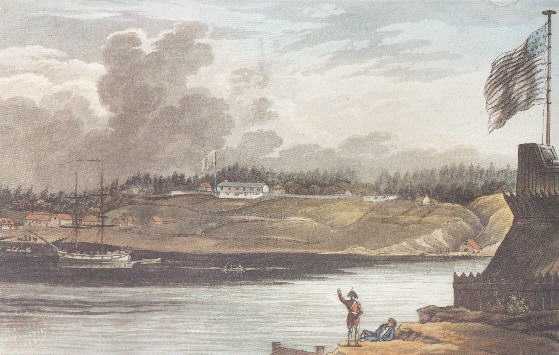

An ordinary, run of the mill, average day in the life of a member of Northumberland’s militia was about as exciting as sliced bread. Don’t get me wrong, it had its moments, but on the average, life was quite dull. By definition a militia’s purpose is to protect its respective country from being invaded, and in the War of 1812 the United States was trying to invade Canada, but the Northumberland Militia never saw any action. Although life may have been boring, it was safe; no militiamen ever died in the heat of battle, because the Northumberland Militia was never in the heat of battle. In fact, the entire war was never really a full-blown war, just two confused countries making one dumb move after another (Refer to the Comedy of Errors page for more details on that ).
Although they were never involved in battle,
the Northumberland Militia did have some important duties locally, and
militarily. On a military level, their most frequent job was escorting
American prisoners of war from York (Toronto) to Kingston. Sometimes
the prisoners would be brought to Amherst (Northern Cobourg today) by another
militia, and then the Northumberland Militia would take them from there.
Of course, back in the early 19th century, this was no picnic. Also,
as you may or may not know, in the winter, with poor roads, marching almost
300 kilometers was not so fun. With only wool coats for protection,
many men in the militia resigned from active service as they had fallen
ill from being unprotected in the cold for so long. In the most severe
cases, some members of the militia even died of the prolonged exposure.
As to be expected, everyone in the militia did not particularly enjoy this
escorting of prisoners. On more than one occasion, members from the
militia were being “very disobedient and disorderly” on their journeys
to Kingston. On their travels around Lake Ontario, the militia would
usually stop for the night at the local inn or tavern. The Captain
who was in charge of the militia would submit a receipt to the Paymaster
in Kingston, who would then pay the innkeeper for his hospitality and services.
Perhaps the most frustrating thing for the militia was that once they had
escorted the prisoners to Kingston, they chronically had problems getting
paid on time. The Paymaster in Kingston would tell them to go see
the Paymasters at Carrying Place (At the mouth of the Bay of Quinte) who
would neglect to pay them as well. Also, the officers of the militia
frequently complained that they were underpaid. The militia was so
disgruntled that they even proposed that the pacifists ( Quakers, Mennonites)
living in Northumberland be required to pay five pounds annually, to help
fund the chronically underfunded militia. Some other jobs including
searching out American spies (one of which stole mail going to Captain
Burnham’s home), and tracking down American Militia deserters in Haldimand
(present day Grafton)
Not only did the militia have to do undesirable
jobs, they were probably the most malnourished militia in Upper Canada
at the time. The militia practically had to beg for food, or rations
in military vocabulary. They were constantly playing second fiddle
to the other militias (such as York) who received their rations, and then
the Northumberland Militia sort of got the leftovers. Sometimes it
took so long to receive food that the officers (captains and lieutenants)
would purchase food with their own money, to keep the troops content.
Obviously this angered the men, which is completely understandable.
After walking a few hundred kilometers out in the elements, the least they
could ask for was a decent meal. They were ignored by officials in Kingston,
and had to write to them multiple times before receiving anything.
It is a good thing that the Northumberland Militia never participated in any battles, because they had no guns or ammunition. It wasn’t until 1814, two years after the war had started, that the militia received any arms from the government. Even then, most of the weapons had been damaged during transportation. In addition to that, the militia was not sent any flints to fire the guns with. If that wasn’t bad enough, there was no gunsmith in Hamilton (Cobourg Area) during the wartime years that could manufacture or repairs arms.
It could be said that although the militia never fought in any of the decisive battles of the War of 1812, they did their part in helping Canada retain its sovereignty. It is also important to note that the militia was very involved in their communities. They were concerned with the ways that land was being surveyed, and what was being done with Native Peoples in the area. Another interesting aspect of the militia was that there was a sentiment among the lower ranked militiamen that the officers were prejudiced in some ways. Some thought that it was peculiar that only men from loyalist families were being promoted in the militia. One ensign even went as far as writing a letter to Kingston demanding that the militia be overhauled, saying that the old officers were corrupt. However, whenever a group of people is doing something undesirable, dissension is a fact of life. On the other hand, most members of the Northumberland Militia were proud Canadians, who sincerely believed that Canada was superior to the United States, and that we would not be absorbed by the USA. Also, many of the letters that the men wrote home expressed concern for their families, which shows that they had some compassion. The Northumberland Militia was not integral in the War of 1812, but they did their part in preserving Canadian Freedom.